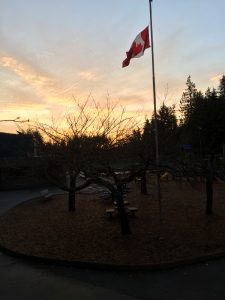Openness, Resilience, Remembrance
November 10, 2016 - 6 minutes readWe speak often about resilience at our school as though it is a good thing – resilience being the ability to calculate the size of a challenge or problem and overcome it.
Normally, resilience is a good thing: we become stronger, more capable people by being challenged and even by struggling.
If your soccer team never played against really difficult opposing teams, if your team never struggled, you may never feel the pressure to do your best. As has been said by Frederick Douglass, “If there is no struggle, there is no progress.”
When we struggle – perhaps enduring something really difficult, or failing at something but still trying ones hardest for a second attempt or a third, or fourth – we become stronger; we develop confidence in ourselves that we can handle difficult things.
So resilience is a character trait that allows people to persevere, to stick with difficult tasks, to accept failure, learn from it and try again. Resilience means that you can do this on your own.
But resilience is also the self-awareness of when to ask for help. Some struggles people deal with in life are so big they need help with them. That gets back to our definition of resilience and to remembrance: to calculate the size of the problem.
In the wars and peacekeeping missions that we take the time to remembe r throughout the year but particularly in ceremonies like ours this morning, we remember people who endured war. Resilience was a good thing, a necessary thing for them, but it is sad how much resilience was needed, that what people had to endure was so horrible. Some did not survive and others did but returned home with injuries both to their bodies and their minds.
r throughout the year but particularly in ceremonies like ours this morning, we remember people who endured war. Resilience was a good thing, a necessary thing for them, but it is sad how much resilience was needed, that what people had to endure was so horrible. Some did not survive and others did but returned home with injuries both to their bodies and their minds.
I’ll briefly describe just one small part of World War One: trench warfare. Imagine, living in a six-foot deep trench, which is basically a muddy ditch. Imagine sleeping on a wooden board, barely keeping you off the muddy bottom of the trench. Imagine stepping in wet mud so often that for days on end, you have wet socks and cold, wrinkly, rotting feet. And it’s November: the winter is coming, with cold temperatures chilling you to the bone and cooling the metal weapons you must hold with your bare hands. And the rats, running up and down the trenches in search of food. Many soldiers endured this for months on end with very few interruptions for rest.
And remember, this wasn’t camping, this was war. The physical difficulties were far less severe than an even scarier threat – the enemy and the bullets and bombs flying overhead. How could anyone endure all that alone?
So it is in those moments of intense struggle or torment where it is essential to recognize when to turn to others for help – to speak about our experiences with others, to receive comfort from them. And there will also be moments when our job is to listen to someone asking for our help – to truly hear them and comfort them in their time of need.
It is with appreciation, sadness, and respect for the bravery, sacrifice, and resilience that we honour the men and women of uniform in the conflicts of our nation’s history. It is sad to reflect on how often the ultimate failure of humanity – violence – has occurred on such a massive scale.
And there are no easy answers for preventing war. But learning about others, understanding and valuing their differences, and believing that the differences among us make the communities and organizations we are a part of stronger not weaker results in more thoughtful, more inclusive, happier and more peaceful places to go to school, to work, to play, to live.
At BICS, our goal of being open – open to meeting new people, to learning about them, open to new experiences, open to new ways of seeing the world – is pretty modest in the grand scheme of things.
But as you venture forward and your communities get larger and larger – from classroom to school to the community of Bowen Island and far, far beyond – I do hope you take openness with you.
Our remembrance, our openness, and a commitment to solving problems peacefully is the least we can do to honour the men and women in uniform and the many people impacted by war.
Recent Comments